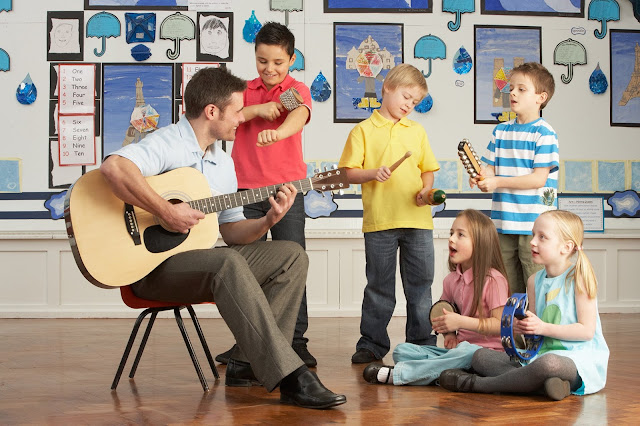Music Lessons for Kids
Private music lessons are an effective way to help your child learn to play an instrument, but for parents who have little musical experience, figuring out how to begin lessons can be a difficult task. This article will show you what is involved in taking music lessons, and help you get your child's music education off to a great start!
First, let's get an idea of what to expect in private music lessons. In lessons, an experienced musician shares her expertise on an instrument with a student who plays the same instrument. During the lesson, the teacher assesses the student's difficulties and strengths, introduces new concepts, and assigns homework. After each lesson, the student learns by practicing the lesson material each day. Music lessons require more commitment than scouts or karate class, because much of the learning is the student's responsibility. If your child practices daily, she builds a foundation that the teacher can expand upon in the next lesson. But without practice, progress grinds to a halt, and you end up paying the teacher to say the same things every week. When you enroll your child in music lessons, it's important to realize that you're signing up for a few minutes of daily practice as well. By understanding what is expected in lessons, your child can make fast progress and have more fun learning music.
Generally, children ages 7 and up who have a strong desire to learn, good listening skills, and willingness to practice are great candidates for lessons. Younger children often benefit more from group classes that teach basic musical concepts in a playful environment. These classes give young kids the chance to learn valuable musical skills without the responsibility involved in private lessons. Having fun with music at home is another great way to introduce young children to music. Singing silly songs, experimenting with sounds, and banging on pots and pans with your children can give them a positive view of music and encourage their creativity. An experienced music teacher at a local elementary school can show you many activities you can do at home to build your child's musical understanding.
If your child is ready for lessons, are you ready to support his musical development? Children generally achieve more when their parents actively support their musical efforts. Driving your child to weekly lessons, attending recitals, and helping her develop a regular practice schedule can lead to lasting musical success. Likewise, considering lessons a valuable investment goes a long way to help your child succeed. Lessons are most effective when taken regularly over a long period of time, so making a long-term commitment to your child's lessons gives him the chance to excel musically.
Once you've decided that lessons are a good fit for your family, it's time to find a good teacher. Generally, the teacher should have substantial experience, and should play the same instrument as your child. Be careful of teachers who claim to teach many instruments. Each instrument is unique, so a teacher who specializes in one or two instruments can provide more detailed, quality instruction than a general teacher can. Good teachers will be more than willing to discuss their teaching approach and expectations, and may even schedule a trial lesson to get to know you and your child better. Take the time to find an experienced, caring teacher who works well with your child. A teacher has the power to shape your child's attitudes toward music for years to come, so make sure to choose someone who empowers your child and makes learning fun.
When your child begins asking to play an instrument, don't feel pressured to start lessons right away. Take the time to decide if lessons are right for your family, and find an excellent teacher. In the meantime, have fun planning musical activities for your family. Go to a concert that features your child's favorite instrument, listen to recordings of the instrument, or visit a music store. Introduce your child to the idea of practicing and taking care of an instrument. Before the first lesson, your son or daughter will already have a strong musical foundation!



Comments
Post a Comment